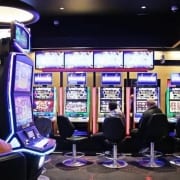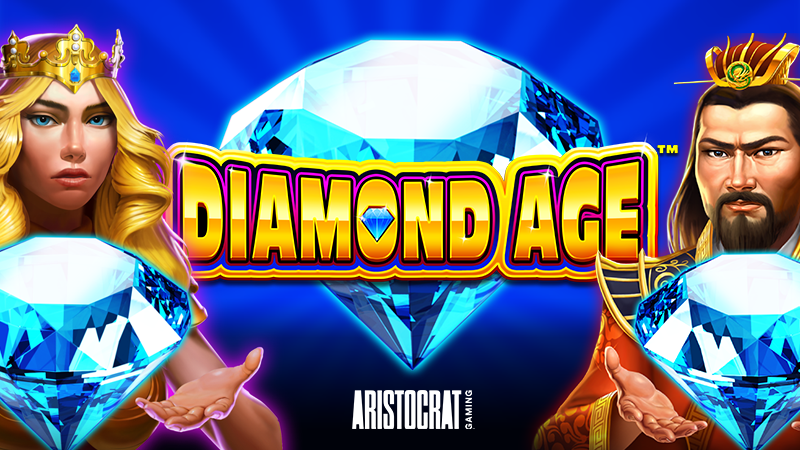CASINOS LOOK TO VIDEO GAMES TO ATTRACT NEW AUDIENCES
American casinos may soon look more like video game arcades.
Whether it’s shooting down enemy planes, strumming a guitar-shaped controller to hit the right notes or swiping a table-top screen to grab the best set of cards first, the next generation of slot machines are going to look a lot like an arcade. Can you imagine Angry Birds and Candy Crush machines next to a high-stakes poker table at Bellagio? Well, it might not be too far off.
In February this year, Nevada and New Jersey passed legislation allowing for the introduction of skill-based games in casinos as a way to attract younger patrons. The idea is that one day, different types of skill-based games will exist on casino floors, including games that look and feel more like console video games, from shooters to racing games.
They could be games where single players go against the house, cooperative games like blackjack, or player versus player games like poker. Gamblit Gaming, a California company that makes skill-based games for casinos, said the biggest attractions could even be well-known franchises like Call of Duty.
Dr Tony Alamo, the chairman of the Nevada Gaming Commission, said the speed with which the legislation to introduce skill-based games in Nevada passed — it was introduced in January 2015 and was signed in June the same year — is a testament to how hungry the casino industry is for something new. “Everyone feels the urgency,” he said.
“It won’t be a sea of slot machines. You’ll see smaller, more intimate areas with specialised themes,” he said.
It seems not even the gambling industry was prepared for how quickly things moved. Dr Alamo said that so far, he had seen products from only two slot machine manufacturers, which first showcased at last years G2E. “We are waiting, and we are here, our arms are open. We want to see product,” he said.
Tom Mikulich, senior vice president of business development at MGM Resorts International, which owns a number of Las Vegas casinos and resorts, including Aria, Bellagio, Luxor, Mandalay Bay, MGM Grand and The Mirage, said the company was “excited” to attract a younger demographic of players and hoped to introduce various skill-based and arcade-style games inside its casinos by the end of this year.
“The majority of visitors to Vegas are under the age of 50, while the majority of those who play slot machines are over 50” – Eric Meyerhofer, Gamblit Gaming CEO
As casino hotels and resorts have steadily upgraded their amenities in the last decade to appeal to a wider demographic, the unintended consequence is that fewer people are actually gambling.
Visitors to places like Las Vegas and Atlantic City now have nightclubs, restaurants, spas, entertainment and sporting events all vying for their attention. In 2014, gambling accounted for 37 percent of total revenue of Las Vegas casino resorts and hotels, down from 58 percent in 1990, according to a 2015 report on the Las Vegas market from consulting company HVS.
Survey data and visitor reports gathered by the Las Vegas Convention and Visitors Authority support this: The percentage of visitors who gambled while in Las Vegas in 2014 was 71 percent, down from 87 percent in 2006.
Young people are flocking to Las Vegas. The problem for operators is how to get them to spend more time on the casino floor. In 2014, millennials made up 27 percent of all visitors to Las Vegas, but only 63 percent of them actually gambled, compared to 78 percent of baby boomers and 68 percent of Generation X visitors.
“The majority of visitors to Vegas are under the age of 50, while the majority of those who play slot machines are over 50,” said Eric Meyerhofer, Gamblit Gaming CEO. “Casino operators are seeing 100 percent of their floor wired for a population group that is no longer the majority.”

While almost everything else in Las Vegas has had a face-lift, slot machines have remained largely untouched since the 1970s: You put money in and push a button, and you either win or lose.
Casino operators have upgraded visual displays in recent years, introducing plasma screens and themed cabinets, but the technology has stayed the same. With the new legislation, casino operators and slot machine manufacturers hope to create games that mirror the emotional demand and investment of console and mobile video games.
“Millennials have grown up in an era of digital media and games. The passive experience of a slot machine does not resonate with them,” Mr. Meyerhofer said.
Gamblit’s current skill-based games are simple, casual experiences. One, called Smoothie Blast, gets players to make smoothies using different types of fruit. Unlike a random slot machine, players can choose which fruits go into the smoothie; some combinations are better than others, resulting in more points and an improvement in the original bet.
Mr. Meyerhofer said Gamblit was working with a number of video game publishers interested in making skill-based games for casinos. For example, the company has partnered with Wicked Witch, an Australian mobile video game developer, to produce a casino version of the developer’s hit mobile game, Catapult King, which has been downloaded over 35 million times and has 250,000 daily active players.
According to Dr. Alamo, the draw of video games has already led a number of casinos in Las Vegas to look into introducing betting opportunities on e-sports — competitive online video game tournaments — as early as in the next few months.
“Imagine that you can walk into a Vegas sportsbook and you can either bet on an N.B.A. playoff game, or an e-sports game like StarCraft. Everyone is on board,” he said.
However, Tomer Perry, a research associate at the Edmond J. Safra Centre for Ethics at Harvard University, said there were moral issues to consider when using video games to attract young people to gambling.
“If gambling tends to have a bad influence on its users, and millennials don’t currently engage in much gambling, then the plan to introduce video games to casinos just expands the reach of gambling,” Mr. Perry said. “We might worry specifically that they are trying to attract younger crowds that might be more vulnerable, have less disposable income and be more susceptible to manipulation. Video games are just an instrument here, but they signal that casinos are going after weaker targets.”
Mr. Perry, who is also a gamer, said that using video games for the purposes of gambling eliminates the psychological benefits that video games can have. “The point of failure in games is to provide an opportunity for growth — to develop skills, and get it right the next time,” he said. “If a game is house-backed, it’s not even letting you do that.”
However, Mr. Meyerhofer added that skill-based games are not about “hooking people in,” like the current generation of slot machines, and are not products “where you’d go if you want to gamble hard,” he said. “They are more about entertainment.”
Article sourced from Yogonet.com/nytimes.com












